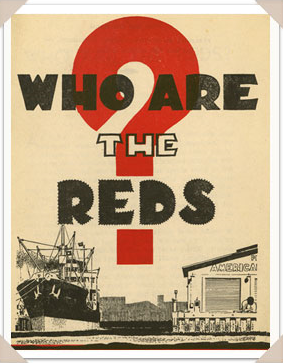
In 1940, the Smith Act was passed, which provided federal criminal penalties for organizing or belonging to any society which  advocated the overthrow of the government by force of violence. The Smith Act was used throughout the 1950s to prosecute members of the Communist Party - U.S.A. In 1951, the United States Supreme Court upheld the constitutionality of the Smith Act in Dennis v. United States. With decline of McCarthyism, the Court decided to revisit the Smith Act in 1957 by accepting the consolidated cases Yates v. United States, Schneiderman v. United States, and Richmond v. United States.
advocated the overthrow of the government by force of violence. The Smith Act was used throughout the 1950s to prosecute members of the Communist Party - U.S.A. In 1951, the United States Supreme Court upheld the constitutionality of the Smith Act in Dennis v. United States. With decline of McCarthyism, the Court decided to revisit the Smith Act in 1957 by accepting the consolidated cases Yates v. United States, Schneiderman v. United States, and Richmond v. United States.
Fourteen leaders of the Communist Party in California were indicted in 1951 in a Federal District Court under the Smith Act for conspiring (1) to advocate and teach the duty and necessity of overthrowing the Government of the United States by force and violence, and (2) to organize, as the Communist Party of the United States, a society of persons who so advocate and teach, all with the intent of causing the overthrow of the Government by force and violence as speedily as circumstances would permit.
The indictment charged that the conspiracy originated in 1940 and continued down to the date of the indictment, and that, in carrying it out, the accused and their co-conspirators would (a) become members and officers of the Communist Party, with knowledge of its unlawful purposes, and assume leadership in carrying out its policies and activities, (b) cause to be organized units of the Party in California and elsewhere, (c) write and publish articles on such advocacy and teaching, (d) conduct schools for the indoctrination of Party members in such advocacy and teaching, and (e) recruit new Party members, particularly from among persons employed in the key industries of the Nation. It also alleged 23 overt acts in furtherance of the conspiracy. The fourteen were convicted after a jury trial, and their convictions were sustained by the Court of Appeals.
In its decision, the Court tempered its prior ruling in Dennis by permitting such advocacy in the abstract if it is not connected to action to achieve this goal. The opinion, written by Justice Harlan, erected new safeguards for freedom of expression while avoiding a reversal of Dennis. As part of these safeguards, the term "organize" was construed to mean the creation of a new organization, making the Act inapplicable to pre-existing organizations. The Court drew a distinction between the "advocacy and teaching of forcible overthrow as an abstract principle" and the "advocacy and teaching of concrete action for the forcible overthrow of the Government," recognizing that instances of speech that amounted to "advocacy of action" were "few and far between."
Justice Clark dissented, arguing that the evidence in Yates paralleled the evidence in the earlier Dennis case.
View Case: Yates v. United States, 354 U.S. 298 (1957)

